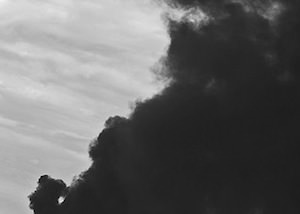Soot a Major Contributor to Climate Change
Reducing emissions of black carbon, also called soot -- a greenhouse gas second only to carbon dioxide in terms of its warming impact on the current climate -- would reduce air pollution and help slow global warming, a study has found.
By Tim Radford, Climate News NetworkThis article first appeared at Climate News Network.
LONDON — Climate scientists have just conceded that they may have been wrong about one aspect of man-made climate change – they have underestimated the dangerous impact of fumes from diesel exhausts and other sources of soot.
Black carbon, as soot is also known, could be twice as bad as previously estimated as an agent of global warming.
The news comes in an exhaustive, 232-page study published in the Journal of Geophysical Research – Atmospheres, written by 31 scientists from the US, Europe, Japan, China and India.
They calculate that, in various ways, black carbon has a warming effect of 1.1 watts per square metre. This makes it two-thirds as influential as the principal man-made greenhouse gas, carbon dioxide. So the second biggest contributor to the global atmospheric crisis is soot.
Soot has, say the scientists of the International Global Atmospheric Chemistry Project, “a unique combination of physical properties.” It strongly absorbs visible light, it is insoluble in water and it sticks around for a long time.
It comes from the burning of coal and wood and dung in Africa and Asia, while diesel engines provide most of the black carbon in the air above Europe, North America and Latin America.
The researchers reckon that 7.5 million tonnes a year of black carbon could be dumped in the atmosphere from power stations, cooking stoves, diesel engines and forest fires, although they also concede that total emissions are difficult to measure precisely.
Black carbon was blamed for a sudden, dramatic melting of Greenland’s ice in the summer of 2012: the source of the soot was wildfires in the Arctic tundra.
“…we need to tackle air pollution and climate change as one joined-up problem.”
The research is a reminder that alarm about atmospheric pollution by human action is not new: soot was a component of notorious urban smog that ultimately claimed hundreds of thousands of lives in the great European cities each year before the introduction of clean air legislation.
According to the World Health Organisation, the smoke just from cooking stoves in the developing world probably contributes to two million deaths from respiratory diseases every year.
So there have always been reasons for worrying about black carbon. But its role as a component of global warming has not been seriously and publicly addressed until now.
The tiny spheres of dark carbon absorb the heat from the sun, can affect cloud formation, and smear and darken the surface of snow and ice, to accelerate warming and melting.
Black carbon is now seen as a significant cause of rapid warming in the mid- to high latitudes of the northern hemisphere, but it can also trigger changes in the patterns of monsoon rainfall in the tropics. So the reduction of emissions could reduce both the risk of respiratory diseases and the rate of climate change in a large region of the globe.
“If we did everything we could to reduce these emissions we could buy ourselves up to half a degree (Celsius) less warming – or a couple of decades of respite,” said Piers Forster of the University of Leeds in the UK, one of the co-authors.
But, he warned, the solution was not straightforward: black carbon is not the only product from fire, and some discharges from burning vegetation might instead have a cooling effect.
Alastair Lewis, an atmospheric chemist at the University of York, UK, who is not one of the research team, said: “This new study helps us see the bigger picture: that we need to tackle air pollution and climate change as one joined-up problem.”
Your support matters…Independent journalism is under threat and overshadowed by heavily funded mainstream media.
You can help level the playing field. Become a member.
Your tax-deductible contribution keeps us digging beneath the headlines to give you thought-provoking, investigative reporting and analysis that unearths what's really happening- without compromise.
Give today to support our courageous, independent journalists.






You need to be a supporter to comment.
There are currently no responses to this article.
Be the first to respond.